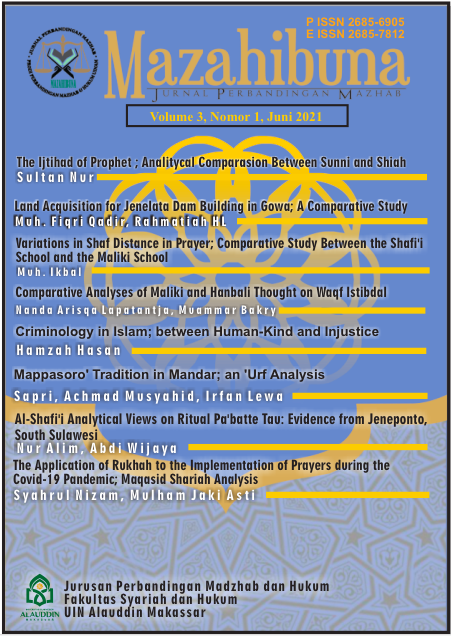Comparative Analyses of Maliki and Hanbali Thought on Waqf Istibdāl
Abstract
This article aims to describe and Analyze dissent from Maliki and Hanbali on the practice of istibdāl endowments and endowment empowerment adopted by Act No. 41 of 2004. Type this research is the library which is based on data management obtained from several kinds of literature. This research approach uses a normative approacpp. This study indicates that there are differences in the views of the Maliki School and the Hambali School related to the practice of istibdal waqf. In this paper, the opinion of the Maliki School distinguishes two categories in the practice of istibdal waqf, namely movable waqf property and immovable waqf property. Movable waqf property is allowed to practice istibdal waqf because the movable waqf property can no longer be used. At the same time, the waqf property that does not move is not allowed to practice istibdal except with emergencies such as the expansion of masjid, cemeteries, and public roads, unlike the case with the Hambali School, which does not distinguish movable waqf property or immovable waqf property. This school prioritizes the benefits of the waqf. If the community can no longer use it, it is permissible to practice istibdal following its terms and conditions. Moreover, the ability to practice istibdal waqf in the Hambali School is quite relevant to conditions in Indonesia, following Law Number 41 of 2004 concerning waqf, which both aim to optimize the benefits of waqf and empowering waqf assets
References
Achmad. Menuju Era Wakaf Produktif, Ver. 1; Jakarta: Mitra Abdi Press, 2005
Al Munawir Ahmad Warson, Kamus Al Munawwir Arab-Indonesia Terlengkap Yogyakarta: Pustaka Progressif, 1997
Al-Muqaddisi, bin Abu Umar Muhammad bin Ahmad bin Qudamah Abdullapp. Al-Mughni ma’a Al-Syarh Al-Kabir. Book6 Mesir: Al-Manar, 1348
Al-Kabis, Muhammad Bait Abdullapp. Hukum Wakaf, terj. Ahrul Ani Fatgurahnab, Ahkam Al-Waqf Depok: Dompet Dhuafa Republika, 2004
Alu Bassam Abdullah bin Abdurrahman, Shahih Bukhari Muslim terj. Khatur Suhardi Syarah Hadis Pilihan Bukhari Muslim, Ver. 1; Jakarta: Daarul Falah, 2002
Asholih Muhammad bin Ahmad bin Sholih, Al-Waqfu fi Syari’atil Islamiyati Ver. I; Riad: Perpustakaan Raja Fahd, 2001
Bakry Muhammad Muammar, “Pengembangan Karakter Toleran Dalam Problematika Iktilaf Mazhab Fikih”, Al Ulum 14, no. 1 (Juni 2014), http//scholar.google.com/jurnal/muammar/muhammad/bakry/23p3 (Diakses 29 Januari 2021)
Halim Abdul, Hukum Perwakafan Di Indonesia Jakarta: Ciputat Press, 2005.
Kementerian Agama. Perkembangan Wakaf di Indonesia, Jakarta: Direktorat Pemberdayaan Wakaf, 2006
_______. Fiqhi Wakaf, Jakarta: Dirjen Bimas Islam, 2005
Musyahid, Achmad. Dirkursus Maslahat Mursalah Era Milineal Tinjauan Filosofis Terhadap Konsep Mashlahat Imam Malik Mazahibuna; Jurnal Perbandingan Mazhab 1, no. 2 (Desember 2019). http//scolar.google.com/jurnal/3349118 (Diakses 20 Januari 2021)
Mughniyah Jawad Muhammad, Al-fiqhi ‘ala Al-Madzahib Al-khamzah terj. Maykur A.B., dan Afif Muhammad, Fiqih Lima Madzab Ver. XXIV; Jakarta: Lentera, 2009
Sabri, Ikimah Said, Al-Waqf Al Islami Bayna An_nazriyyah Kwa St-Tatbid, Amman: Dar-an-Nafais, 2008
Suhardi, Imam. Wakaf Untuk Kesejahteraan Umat. Yogyakarta: PT Dana Bhakti Prima Yasa, 2002
Syaraf bin Yahya Syeh Imam Muhyidin Zakariyah, Kitab Shahih Muslim Book1; Damaskus Syiria, 2010
Qardhawih,Yusuf. al-qur’an wa as-sunnah Fii Fiqh al-Aulawiyaati Dirasaah Jadillah Fii Dhau, terj. Muhammad Nurhakim, Urutan Amal Yang terpenting Dari Yang Penting Jakarta: Gema Insani Press, 1996
Qahaf, Mudzir. Manajemen Wakaf Produktif , Ver.1; Jakarta: Khalifah, 2005.
Zahra, Muhammad Abu. Muhaddarat Di Al-Waqf, Kairo: Tar Al-Fikr Al-arabi, 2015.

This work is licensed under a Creative Commons Attribution 4.0 International License.
Authors who publish with Mazahibuna: Jurnal Perbandingan Mazhab agree to the following terms:
- Authors retain copyright and grant the Mazahibuna: Jurnal Perbandingan Mazhab right of first publication with the work simultaneously licensed under Creative Commons Attribution License (CC BY 4.0) that allows others to share the work with an acknowledgment of the work's authorship and initial publication in this journal.
- Authors can enter into separate, additional contractual arrangements for the non-exclusive distribution of the published version of the work (e.g., post it to an institutional repository or edit it in a book), with an acknowledgment of its initial publication in this journal.
- Authors are permitted and encouraged to post their work online (e.g., in institutional repositories or on their website) before and during the submission process, as it can lead to productive exchanges, as well as earlier and greater citation of published work.

